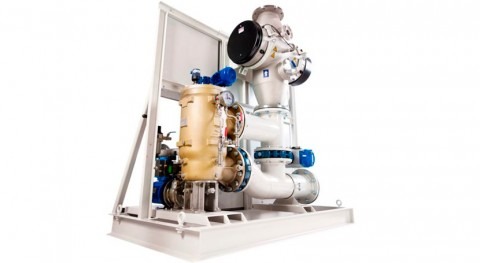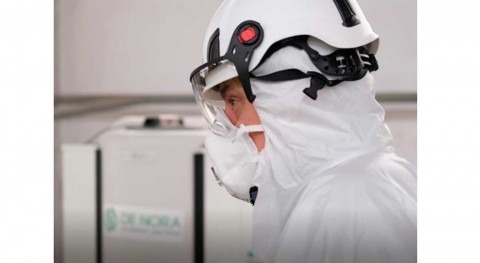With headquarters in the Italian city of Milan, the worst-hit country by the coronavirus pandemic, with over 6,000 deaths, De Nora Water Technologies provides a range of trusted disinfection, oxidation and filtration technologies and aftersales support services for water and wastewater treatment in the energy, marine and municipal markets worldwide.
We interview Luca Buonerba, Chief Marketing and Business Developer Officer at De Nora, to learn how the business is dealing with the outbreak, and what measures have been adopted to keep its staff safe and the company running in such a difficult time.
Question: What measures is De Nora putting in place to protect its employees against the coronavirus?
Answer: Our company is encouraging people to work from home
All employees have been provided with a protective mask (FFP2 or FFP3), which is replaceable under request when worn.
In all common areas, a sanitizer dispenser is available, that is periodically refilled with a Sodium Hypochlorite solution. All colleagues have been provided with a personal dispenser with sanitizer solution and additional solution is available at the main lobby for free refills.
Cleaning activities are undertaken every day on commonly used tools and areas such as desks, chairs, door handles, restrooms, locker rooms and the canteen, with comprehensive cleaning and disinfection procedures taking place twice a week.
Access to the common areas (locker rooms, canteen) is limited to ensure proper social distancing.
Our company is encouraging people to work from home
Q: What impact do you think the COVID-19 crisis will have on the water industry, and more specifically on your entity?
A: Drinking water is required by law to be treated before distribution to meet all point of use regulatory standards. This ensures that water is safe and can be consumed without any additional treatment. Water companies invest in infrastructure to meet these standards and undertake regular tests ensure they are not in violation. Currently there is no evidence from surrogate human coronaviruses that they can be found in surface or groundwater sources or transmitted through contaminated drinking-water.
A technical brief from the World Health Organisation (WHO), released in early March for water and sanitation practitioners and providers described that COVID-19 as an enveloped virus, is “not robust”, and is less stable in the environment and more susceptible to oxidants, such as chlorine. Conventional, centralised water treatment methods that use “filtration and disinfection should inactivate the COVID-19 virus”. Therefore, the impact on the water sector is not linked to water treatment, but instead to possible phenomena such as absenteeism, services interruptions such as delivery of chemicals, technical assistance and maintenance provision.
This absenteeism could affect drinking water and wastewater system operators in their ability to operate and maintain their systems adequately, thereby increasing the risks to public health. Absenteeism would also affect workers from other essential and interdependent sectors such as the transportation, power and chemical sectors. It could adversely impact on services such as delivery of chemicals, maintenance and other essential materials and supplies.
De Nora has already provided systems for the production of sodium hypochlorite in China, Japan, USA, Singapore and in Italy
The impact that the crisis could have on our company is wide ranging:
- Absenteeism and associated continuity of operation
- Impact on production sites with employees facing difficulty in reaching these locations from their homes
- Supply chain problems with reduced availability of raw materials and semi-finished products
The effects on the business can be impacted by:
- Employee illness
- Restrictive regulations that limit the movement and operation of production plants
- Problems in the domestic and international transportation of people and goods
- Closure of suppliers or problems with the continuity in the supply of raw materials
- Slow down of import/export processes
- The business continuity has already been compromised as regards the commercial activities: sales people face limitation in making visits to customers and many international tenders for large contracts have been suspended.
On the other hand, De Nora is securing some orders for the supply of small systems for the on-site production of low strength sodium hypochlorite (bleach). This offers a solution to meet the shortage of disinfectants that has been experienced in several countries due to the sudden increase in demand anywhere up to 40x the normal levels.
De Nora has already provided systems for the production of sodium hypochlorite in China, Japan, USA, Singapore and in Italy.
In Italy, De Nora is supporting the efforts of the Civil Protection Department by deploying electrochlorination systems in northern Italy, near Milan.
We are trying to keep production unaffected as we directly supply and service critical industries making chemicals in addition to several water and wastewater facilities
In USA, given the lack of availability of disinfectant in supermarkets, the Fort Bend CSO, in collaboration with the Office of Emergency Management, started distributing bottles of sodium hypochlorite free of charge to residents from 20 March 2020. All of this was possible thanks to a De Nora initiative to make a ClorTec® mobile unit available to produce sodium hypochlorite solution using just food grade salt, water and electicity. The unit can produce up to 93,000 liters of sodium hypochlorite per day. The first mobile center was located at the Gus George Law Enforcement Academy at 1521 Eugene Heimann Circle in Richmond, Texas.
In terms of impact on our business we are trying to keep production unaffected as we directly supply and service critical industries making chemicals in addition to several water and wastewater facilities (both public and private) where continuity of operations is critical to overcome the crisis.
Q: What measures do you think should be taken to overcome this crisis?
A: Lock down people at home and raise the awareness of the risks related to the pandemic. Government institutions must employ clear and accurate communications, avoiding panic but giving clear indication that lock down and the use of all possible precaution like distance and additional disinfection of surfaces are the only available effective measure.















